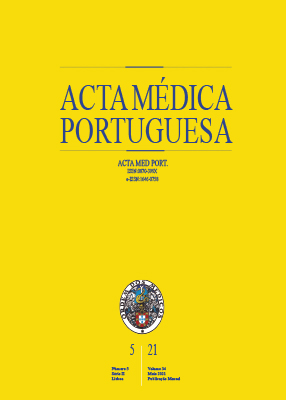Biological Therapy in Patients with Rheumatoid Arthritis in a Tertiary Center in Portugal: A Cross-Sectional Study
DOI:
https://doi.org/10.20344/amp.13605Keywords:
Arthritis, Rheumatoid/drug therapy, Biological Products/therapeutic use, Biological Therapy, Quality of LifeAbstract
Introduction: Clinical outcomes in rheumatoid arthritis have greatly improved with therapeutic advances. Despite the availability of substantial clinical trial evidence, there is a lack of real-life data. The aim of this study was to assess disease status and quality of life in an outpatient population treated with biological disease-modifying anti-rheumatic drugs.
Material and Methods: Cross-sectional study recalling all patients ever treated in our unit with biological disease-modifying antirheumatic drugs. Clinical and demographic data, compliance, disease activity, functional status, joint deformities, and comorbidities were documented, and patients queried on occupational status, education, marital status and generic health related quality of life questionnaires.
Results: Recall was attended by 77 of the original 94 patients. At recall, median age was 63 years old, 82% of the patients were female and the median disease duration was 12 years. Biological therapy was started at a median of four years following disease onset. According to the disease activity score (DAS28), the percentage of patients with high, moderate, low disease activity or remission changed from 50, 45, 0 and 5 (pre-therapy) to 11, 37, 25 and 26 at recall, respectively; functional status was significantly improved. Seventy-five per cent of the patients retained the original treatment with good compliance. Lower Short Form-36 domain scores accompanied a low EQ-5D-3L score. Deceased patients (n = 6) had a lower estimated 10-year survival rate. In this group, biological therapy was discontinued at a higher frequency during follow-up.
Discussion: A high disease activity and a high HAQ disability index characterized most patients at pre-bDMARD onset.
Conclusion: Despite therapy switches and regular follow-up, a significant percentage of patients still presented with moderate disease activity, functional impairment and a poor health-related quality of life.
Downloads
Downloads
Published
How to Cite
Issue
Section
License
All the articles published in the AMP are open access and comply with the requirements of funding agencies or academic institutions. The AMP is governed by the terms of the Creative Commons ‘Attribution – Non-Commercial Use - (CC-BY-NC)’ license, regarding the use by third parties.
It is the author’s responsibility to obtain approval for the reproduction of figures, tables, etc. from other publications.
Upon acceptance of an article for publication, the authors will be asked to complete the ICMJE “Copyright Liability and Copyright Sharing Statement “(http://www.actamedicaportuguesa.com/info/AMP-NormasPublicacao.pdf) and the “Declaration of Potential Conflicts of Interest” (http:// www.icmje.org/conflicts-of-interest). An e-mail will be sent to the corresponding author to acknowledge receipt of the manuscript.
After publication, the authors are authorised to make their articles available in repositories of their institutions of origin, as long as they always mention where they were published and according to the Creative Commons license.









